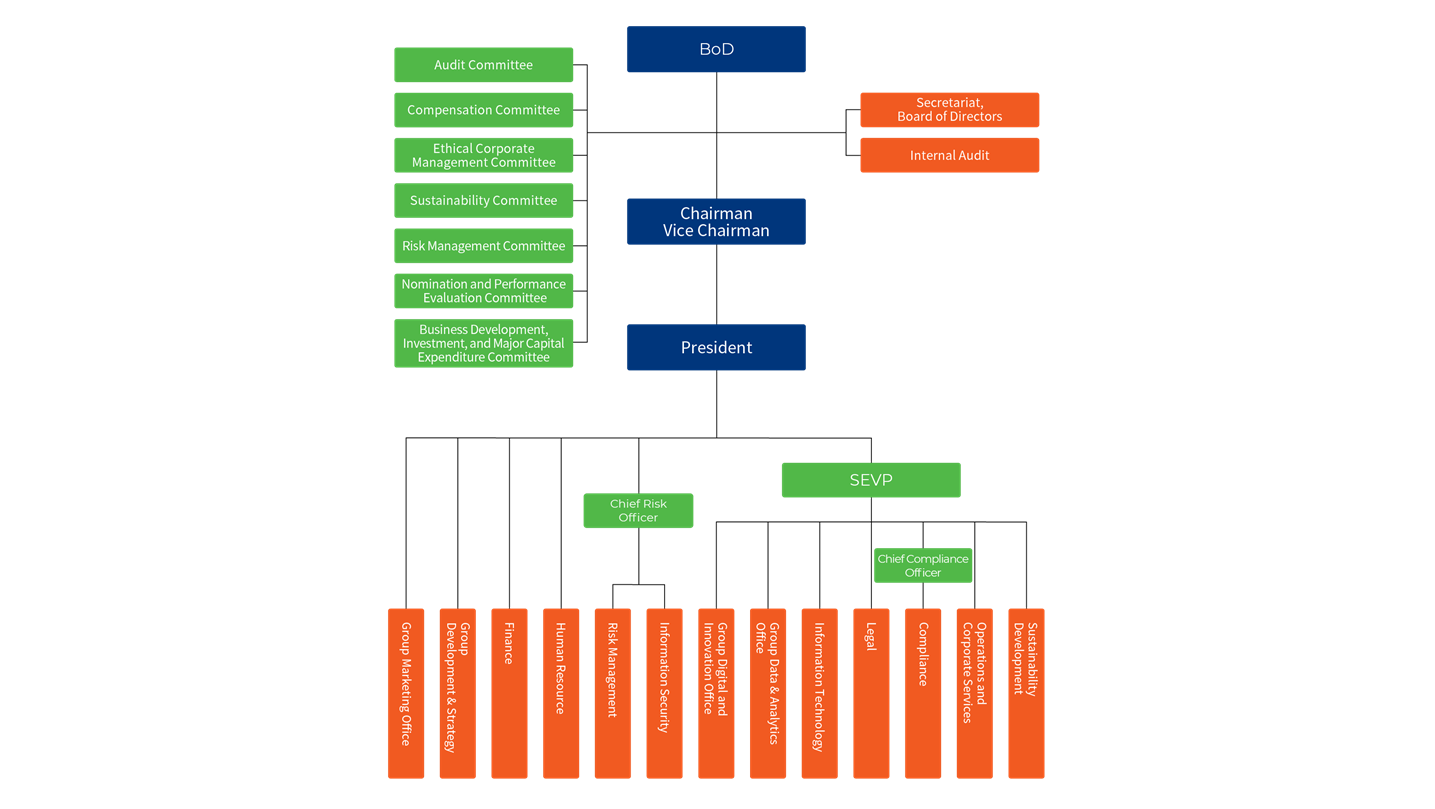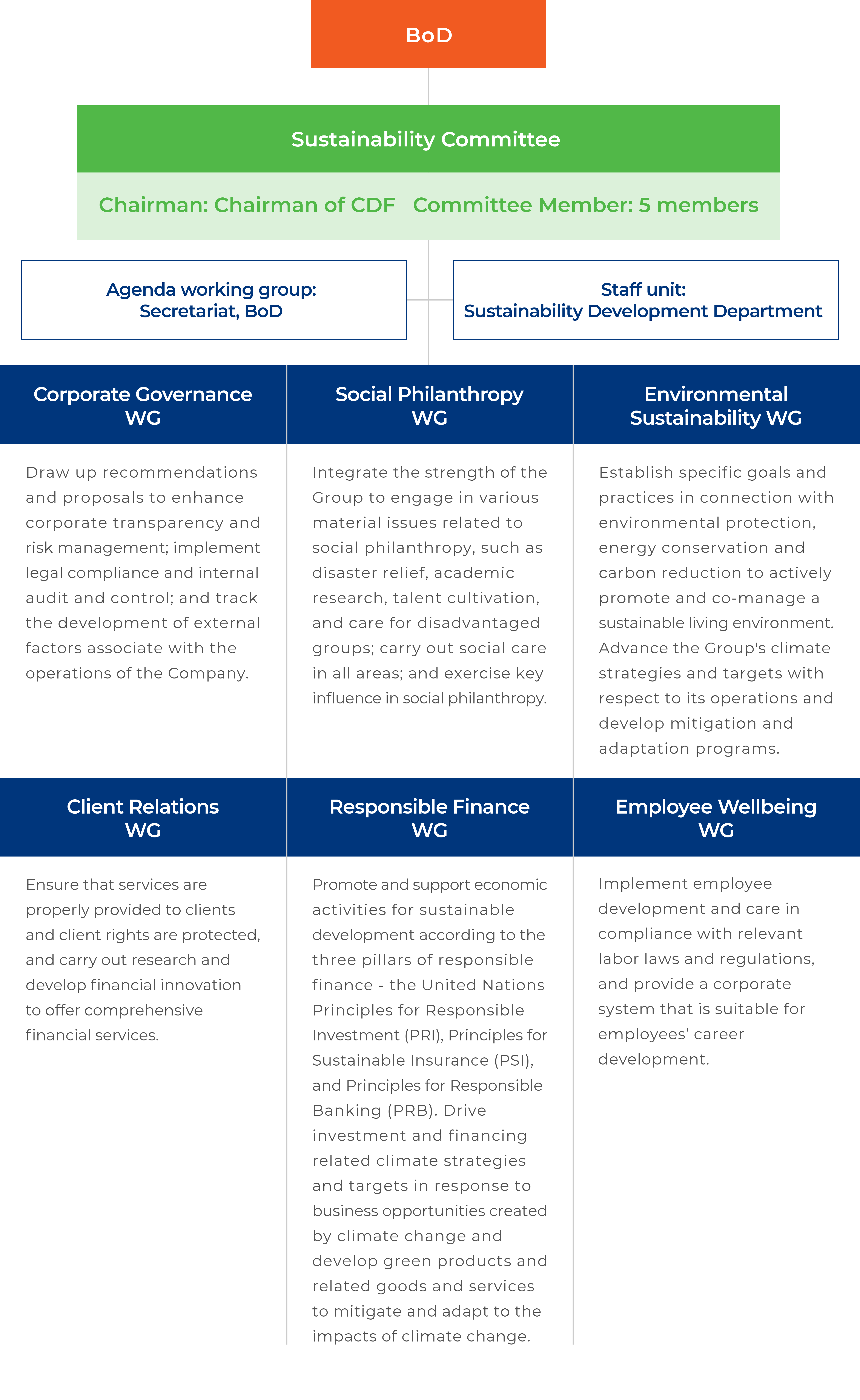Corporate governance has emerged as a global trend and is essential to gauge a company’s true value. CDF strongly believes that achieving sustainability as well as winning the trust of investors stems from the implement of sound corporate governance. CDF’s internal rules, established in accordance with the “Corporate Governance Best-Practice Principles for Financial Holding Companies” approved by the competent authority, clearly defines the organization structure and the functions of each department. CDF has also set up an independent audit department and explicitly outlined that managers of this department shall not have duties irrelevant to internal audit to avoid any conflicts of interest.We protect shareholder rights and ensure our shareholders have the right of "one share, one vote" in accordance with the law. Shareholders may exercise their rights to vote and participate in the decision making in the Annual General Meeting (AGM).

With the growing trend of global sustainability, the Financial Supervision Commission (FSC) successively launched the “Green Finance 3.0 Action Plan,” “Corporate Governance 3.0 - Blueprint for Sustainable Development,” and “Roadmap for the Sustainable Development of TWSE/TPEx listed Companies” in order to actively respond to various government regulations.
The Company policy goals include “active involvement in public affairs, promote economic, social and environmental ecology balance and sustainable development to practice corporate social responsibility.” The BOD sets up “Sustainability Committee” consisting of six task work groups, including corporate governance, social welfare, environmental sustainability, responsible finance, customers' interests, and employee care. The Group director acts as committee member and senior management acts as group leaders, who propose and execute ESG agenda with responsibility in launch of annual plan.
All work groups shall collect opinions from internal and external stakeholders through questionnaire survey when drafting the ESG related plan, and identify ESG material issues as the reference for annual promotional plan. Meanwhile, the corporate shareholders of the Company also conduct exchange and audit on the economic, environmental and social (ESG) agenda focused through director representatives, BOD or Sustainability Committee meetings. The Sustainability Committee will regularly report to the BOD for the annual work plan and execution status of all work groups, so that the Company's “Sustainability Committee” can follow accordingly for operations. The BOD adopted the formulation of “Sustainability Committee Articles of Incorporation.” In 2022, a total of 4 Sustainability Committee meetings were convened. According to the duties defined under the Company's “Sustainability Committee Articles of Incorporation,” the key agenda of annual sustainable development is audited, including: Report on the 2021 work plan execution, passing 2023 sustainable development plan, and other agenda. The Company's sustainability report is prepared by group marketing plan office and the Sustainability Development Department is responsible for collecting data from all departments. After all work group leaders verify and through the validation conducted by third-party notary, the agenda shall be reported to the Sustainability Committee and BOD for adoption.

- Handling matters relating to board meetings and shareholders meetings according to laws.
- Producing minutes of board meetings and shareholders meetings.
- Assisting in onboarding and continuous development of directors.
- Furnishing information required for business execution by directors.
- Assisting directors with legal compliance.
- Reporting to the Board of Directors the review results of independent directors’ qualifications comply with laws and regulations at the time of nomination, election and during appointment periods.
- Handling matters relating to director changes.
- Other matters set out in the articles of corporation or contracts.
































- Internal audit must disclose the following items:
(1)Prepare internal audit working manuals and working papers and whether the internal controls are carried out in a reasonably effective manner, and from time to time provide recommendations for improvement.
(2)The internal audit department shall monitor the rules and procedures for self-inspection and assessments of the internal control system by business and management units, and the implementation of periodic self-inspection by each unit.
(3)Formulate annual audit plans and, based on the business risk profile of and implementation of internal audits by each subsidiary or department, determine audit plans targeted at each individual subsidiary or department.
- The internal audit department shall draft a written audit plan for the coming year at the end of each year to get the audit committee and the board's approval.
- The internal audit department presents an audit plan for the coming year to the supervisory authority via the internet in the prescribed format the end of every year, as will as a review of the previous year's audit operations by the end of February and a report on improvements made to the previous year's internal control issues by the end of May.
- The internal audit department shall conduct a routine business audit at least annually, and a special business audit on CDF's subsidiaries' finance, risk management and legal compliance with applicable acts and regulations at least semiannually. Other audit activities that cover the derivatives business should be conducted on a monthly basis.
- The internal audit report shall delivered to audit committee for review after is reported to the chairman and president & CEO within two months of completion and filed with the competent authority for recordation via an internet-based information system.
- A written report on the continued improvements as required by the supervisory authority, the CPA, the audit office and the compliance department is sent to the board and supervisors and is used as a key reference material for performance appraisal.
- The internal audit department shall supervise CDF's domestic and overseas subsidiaries in accordance with relevant regulations.
- The internal audit department assesses internal audit operations at subsidiaries once a year, submits an assessment report to the board and sends the same report to the boards of CDF subsidiaries as reference materials for performance appraisal.
- The CDF internal audit office oversees the annual self-assessment of internal controls of each department and subsidiary and reviews the subsequent reports. The reports, along with the opinions of the financial examination authority, CPA and internal audit department, are submitted to the chairman, president & CEO, chief audit officer and legal compliance officer as reference materials for evaluation of the internal control system and the drafting of an internal control compliance declaration.
- The internal audit department shall organize self-inspection programs for every year and continue proper training courses for auditors in accordance with the nature of each department.
- In case of fraud and other major legal infractions, the internal audit department shall inspect all business activities, including appropriate policies and procedures as follow:
(1)Report to the Chairman of the Board and the independent directors and inform the competent authority when significant deficiency or malpractice in compliance matters occurred. All relevant material that has been submitted to the competent authority shall be reported to the audit committee for approval.
(2)Prepare a written report for submission, with a notice to the Chairman of the Board and get the audit committee approval and report to the competent authority, when their recommendations for improvements regarding significant deficiencies or noncompliance identified in internal controls are not accepted by management and as a result CDF or its subsidiaries might incur a material loss.
(3)Request the respective departments where significant deficiency or malpractice occurred to take immediate and adequate countermeasures and shall continually conduct follow-up reviews on matters specified as requiring stronger improvement efforts. The written report on the implementation of improvement of deficiencies shall be submitted to the audit committee and the board of directors for approval.
- In order to improve audit quality and enhance auditing staffs' professional developments, auditing staff are required to take internal or external training courses of at least 30 hours per year to enhance their expertise. Since 2007, CDF internal audit department has organized an annual one-day training event for all auditors, as well as occasional study groups to enhance their expertise. Auditing staff also participate in domestic and international conferences to improve their knowledge of advanced auditing concepts and methods to boost workplace efficiency.
- Other auditing activities
(1)Items requested by the supervisory authority.
(2)Supervision of procurement at CDF and its subsidiaries.
(3)Participation in internal and external symposiums and conferences.
- The CDF internal audit department, which is subordinate to the board of directors, is in charge of general auditing affairs and the organization and scope of internal audits. The department, as a disinterested body, reports to the board and audit committee at least every half year.
- The position of chief audit officer, who supervises all auditing staffs, is on a par with that of VP, and his/her hire, dismissal or transfer shall not come into effect until approved by two thirds of board members and the supervisory authority.

• Customer privacy and personal data protection
• Corporate Governance and Ethical Management
• Improve service quality and customer complaint management
• 24-hour service hotline, complaint hotline, and website visitor message board
• Held Customer Care Committee meeting to establish customer-care mechanism
• Conduct irregular customer satisfaction survey
• Hold irregular financial workshops and wealth management seminars
• LINE friends: 43,000 (+32%) of KGIB, 1,260,000 (+400%) of KGIS
• Customer satisfaction: 96.7% for KGIB, 99.9% for CL and NPS for KGIS with a score of 64%
• Held 421 anti-fraud advocacy meetings, 1,243 financial planning seminars, and 88 wealth management seminars
• Maintain shareholders' equity
• Supply Co-Prosperity Sustainable Development
• Upgrade financial inclusion
• All subsidiaries, CDF Foundation and KGI Charity Foundation serve as the contact channel to communicate with related community groups
• 101 free lectures on innovation and entrepreneurship, with 2,076 persons involved
• Diversified talent appointment and training
• Occupational safety and health
• Maintain shareholders' equity
• Labor protection and workplace inclusion and equality
• Irregular announcement on internal website, e-mail bulletin, and suggestion box
• Regular labor-management meeting
• Labor union
• 28 labor-management meetings
• Collected employee opinions regularly
Competent Authorities
• Business continuity
• Customer Privacy and Personal Data Protection
• Irregular visit the competent authority from time to time
• Set up mailbox for government and competent authorities
• Selected as a constituent stock of the TWSE Corporate Governance 100 Index, TWSE RA Taiwan Employment Creation 99 Index, and Taiwan High Compensation 100 Index
• Responded to unscheduled audit to provide real-time information
• Maintain shareholders' equity
• Irregular roadshow to share with investees
• Irregular visits to investees
• Set up investee mailbox
• Visited investees' companies voluntarily 487 times in 2022
• Held 12 one-day startup Board meetings
• Business continuity
• Customer Privacy and Personal Data Protection
• Upgrade service convenience with digital finance
• Irregular press conference
• Set up media service mailbox
• Held press conferences from time to time
• Improve service quality and customer compliant management
• Upgrade service convenience with digital finance
• Corporate Governance and Ethical Management
• Annual shareholders' meeting
• Quarterly domestic institutional investor conference, irregular analyst visits, conference calls, and forums
• Shareholder services and investor relations contact persons
• 1 shareholder meeting to publish annual report
• Held 7 institutional investor conferences and 12 institutional investor conferences held by securities brokers
• 107 visits of corporate analysts and conference calls
• Regular communication through the contact persons
• Communicated with foreign investors through online institutional investors and annual report in English
• Supplier Co-Prosperity Sustainable Development
• Irregular pre-bidding briefing
• Irregular supplier audit, evaluation, self-assessment, education and training and distinguished supplier recognition
• Establish procurement mailbox and hotline.
• Irregular participate in the green procurement projects from time to time
• Held pre-bidding briefings
• Conducted supplier audits, supplier evaluations, and supplier self-assessments from time to time
• Conducted real-time two-way communication with suppliers via procurement mailbox, which was used for supplier training during the pandemic
The Company shall keep the whistle-blowers’ identity and relevant documents confidential, encrypted, and properly stored with restricted access.
If the whistle-blower is an employee of the Company or an employee of one of the Company’s subsidiaries, the Company shall provide appropriate protective measures to ensure that the whistle-blower will not receive any improper treatment due to the reporting.
